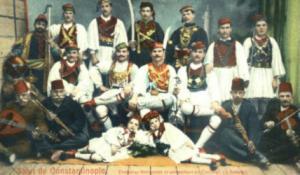Sada Payır (University of Oxford, Faculty of Oriental Studies)
Entertainment, Propriety, Transgression: The ‘Unorthodox’ Greeks of Istanbul in the Late Ottoman Empire
Sada Payır’s doctoral project builds on her master thesis which examined transgression within the Greek Orthodox population of Pera and Galata from the mid-nineteenth century to the First World War. The choice of studying people from this ethno-religious group was due to several reasons: Firstly, they did not share the same religion with the rulers of the Empire. Secondly, during the Tanzimat period, non-Muslims in the Ottoman Empire were granted new rights in terms of citizenship, religion, and education upon which new churches, modern schools and cultural societies were introduced to the Greek Orthodox community of Istanbul. Finally, it became enticing to acquire knowledge on the Greek Orthodox individuals who did not have any access to education whatsoever, and may have been shunned because of their occupations and characteristics during a time when the community was experiencing economic prosperity and intellectual development.
The doctoral project extends to the whole city and aims to show the ways in which the Greek Orthodox people in the entertainment sector as well as their clientele transgressed social, moral, and – to a certain extent – legal boundaries in the eyes of the Ottoman state, the Greek Orthodox lay and clergy, and the society in late Ottoman Istanbul. With respect to these different perspectives, Sada Payır proposes to find where the transgressors stood during an era when the Greek Orthodox community was manifesting signs of a move towards a more tight-knit community life and the Ottoman Empire was experiencing administrative and urban transformation. She argues that transgressions linked with entertainment generated different concerns for different parties even if their perspectives on the features of these transgressions overlapped. By shedding light on these concerns, her project intends also to reconsider the idea of ‘the black sheep of the family’ and tries to bring new perspectives to the reading of non-Muslim communities in the late Ottoman Empire.

